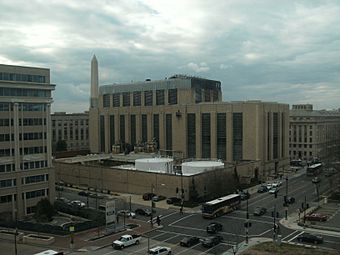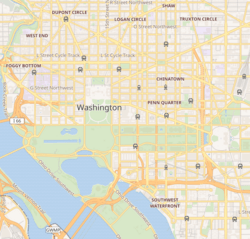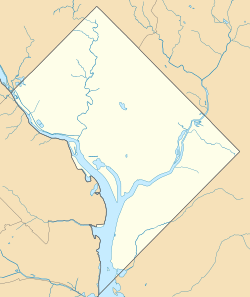Central Heating Plant facts for kids
Quick facts for kids |
|
|
Central Heating Plant
|
|
 |
|
| Location | 325 13th Street, SW Washington, D.C. |
|---|---|
| Built | 1933 |
| Architect | Paul Philippe Cret |
| Architectural style | Art Deco, Industrial |
| NRHP reference No. | 07000637 |
| Added to NRHP | July 06, 2007 |
The Central Heating Plant is a big building in Washington, D.C. It acts like a giant furnace for many important buildings. These buildings belong to the United States government. They are located near the National Mall, a famous park area.
This plant was built in 1933. It was designed by an architect named Paul Philippe Cret. When it was new, it was the largest heating plant of its kind in the whole country. It provided heat for 22 federal buildings! Today, the General Services Administration (GSA) runs it. The GSA helps manage government buildings. In 2007, the Central Heating Plant was added to the National Register of Historic Places. This means it's a special historical site.
Contents
A Unique Design for a Heating Plant
Paul Philippe Cret gave the Central Heating Plant a special look. He used a style called Art Deco. This was different from most buildings in Washington, D.C. Many buildings there used a more traditional, "classical" style.
Cret made the building fit in well. He used tall, flat columns called pilasters. He also added vertical strips of windows. These elements looked a bit like the classical columns found on other government buildings.
Clever Smokestacks
The plant has three tall smokestacks. Cret designed the roof so these smokestacks would not stick out too much. They only rise about 42 feet (13 meters) above the roof. This design pleased the city's art commission.
Art on the Walls
You can see cool designs on the building's outside walls. These are made from limestone. They show pictures of things inside the plant. For example, you can see a boiler, a safety valve, and a fan. These pictures help explain what the building does. The Central Heating Plant is known as an early example of Modernism in architecture. It's also just a very attractive building.
How the Plant Works
The Central Heating Plant was first built to burn coal for heat. Over time, it was updated. Now, it uses oil and natural gas instead.
In 1957, a large refrigeration plant was built next to it. This new plant helps cool buildings. It covers part of the heating plant's side.
See also
 In Spanish: Central Heating Plant para niños
In Spanish: Central Heating Plant para niños
 | Misty Copeland |
 | Raven Wilkinson |
 | Debra Austin |
 | Aesha Ash |




